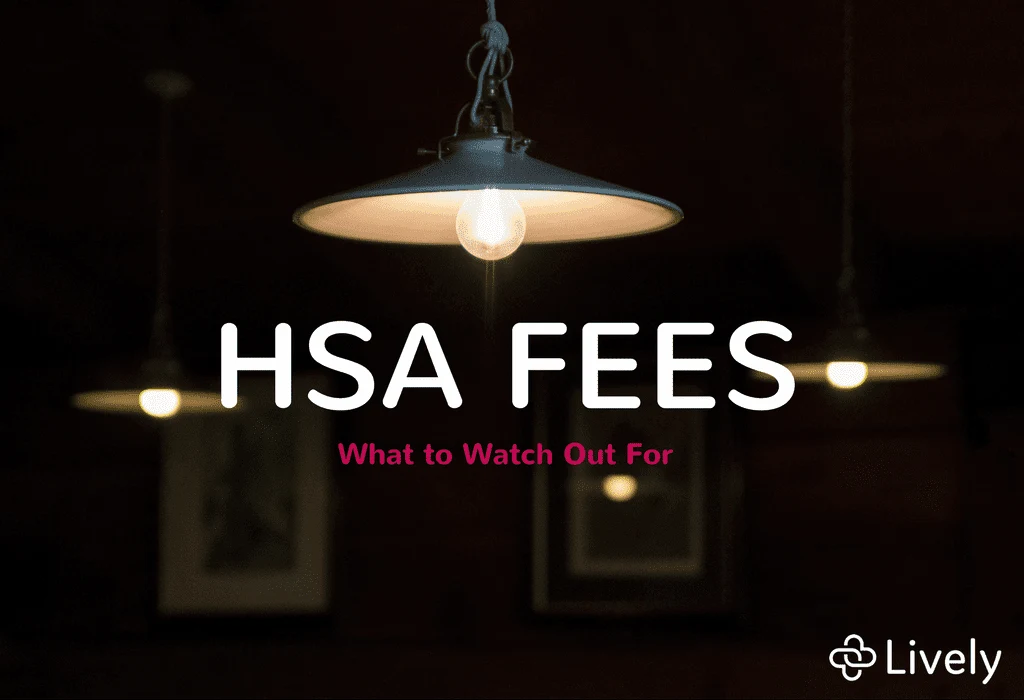The Lively Blog
SIGN UP FOR OUR
Newsletter
Stay up to date on the latest news delivered straight to your inbox
HSA Fees That Add Up
Lively · July 26, 2017 · 2 min read

HSAs are a clear way to save money for your health, both for short-term and long-term expenses. Their triple tax advantages and automated payroll deductions create such an easy and obvious way to save tax-free dollars. Once you set up an HSA you are set to save month after month; money you can use today or save for retirement.
Common HSA fees can steal money from your health savings. Let us help you understand costs you can watch out for when evaluating your current or future HSA provider.
Common fees
Monthly maintenance fees (for individuals): this is a set fee just for having an account with your HSA provider. Debit card or ATM transactions and check processing fees for paying for health related expenses. Copy of statements both monthly and tax forms so you can properly report and track your HSA usage. Legal fees often associated with legal processing related to your HSA account. Account closure that's right! If we want to move to a new HSA provider, you might be charged to get out of your contract. Debit card replacement if lose your card, you may need to pay a small fee to replace it.
Investment fee considerations
Some accounts charge you fees to access investments or require a minimum balance in order to invest. When you are investing your HSA, pay attention to these requriements:
Minimum account balance: often you will find minimum account balance requirements to invest, such as $1,000/account.
Pre-selected funds: HSA providers will limit the number of mutual funds for individuals or add fees for non-restricted access. Be aware of the availability before you commit to a new HSA provider.
Investment minimums can limit the amount that you are able to save over time. Take the time to investigate any hidden or unknown fees your HSA provider charger to ensure they aren't stealing value from your health account.
At Lively, we believe in 100% transparency, including pricing. You won't get nicked and dimed at Lively. Here are our full pricing details, but to save you some time, Lively is free for individuals. If you are ready to open an HSA with no hidden fees and access to industry-leading investment options, reach out to us today.

Benefits
2025 and 2026 HSA Maximum Contribution Limits
Lively · May 9, 2024 · 3 min read
On May 9, 2024 the Internal Revenue Service announced the HSA contribution limits for 2025. For 2025 HSA-eligible account holders are allowed to contribute: $4,300 for individual coverage and $8,500 for family coverage. If you are 55 years or older, you’re still eligible to contribute an extra $1,000 catch-up contribution.

Benefits
What is the Difference Between a Flexible Spending Account and a Health Savings Account?
Lauren Hargrave · February 9, 2024 · 12 min read
A Health Savings Account (HSA) and Healthcare Flexible Spending Account (FSA) provide up to 30% savings on out-of-pocket healthcare expenses. That’s good news. Except you can’t contribute to an HSA and Healthcare FSA at the same time. So what if your employer offers both benefits? How do you choose which account type is best for you? Let’s explore the advantages of each to help you decide which wins in HSA vs FSA.

Health Savings Accounts
Ways Health Savings Account Matching Benefits Employers
Lauren Hargrave · October 13, 2023 · 7 min read
Employers need employees to adopt and engage with their benefits and one way to encourage employees to adopt and contribute to (i.e. engage with) an HSA, is for employers to match employees’ contributions.
SIGN UP FOR OUR
Newsletter
Stay up to date on the latest news delivered straight to your inbox
